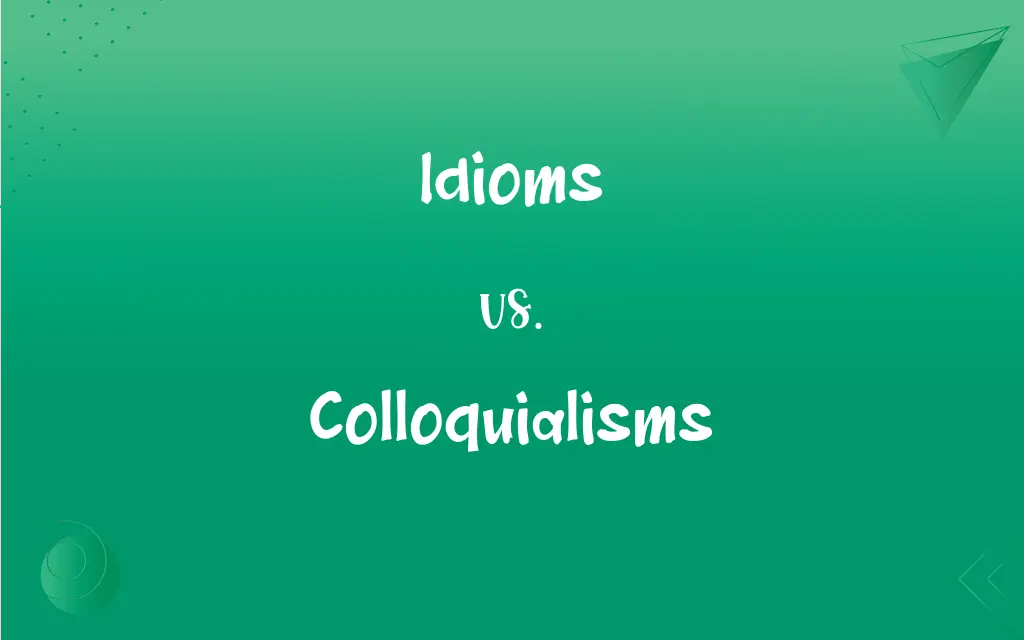Idioms vs. Colloquialisms: What's the Difference?
Edited by Aimie Carlson || By Janet White || Published on December 22, 2024
Idioms are fixed expressions with non-literal meanings, while colloquialisms are informal words or phrases used in everyday speech.

Key Differences
Idioms are expressions whose meanings cannot be inferred from the meanings of the words that make them up. For example, "kick the bucket" means to die, which cannot be understood just by looking at the words themselves. Idioms enrich the language by adding depth and cultural significance, making conversations more vivid and expressive. Colloquialisms, on the other hand, are informal terms or phrases used in casual conversation. They reflect the spoken aspect of a language and are often specific to a particular geographical area or social group. Colloquialisms can include slang, but they are not necessarily improper or vulgar; they simply denote a more relaxed way of communication.
Idioms are established phrases with fixed meanings that are metaphorical or symbolic, colloquialisms are more about ease of communication and can include idiomatic expressions, but also slang, contractions, or any informal language. The key difference lies in their usage: idioms convey a specific meaning not deducible from the individual words, whereas colloquialisms simplify speech in informal settings.
Idioms are an integral part of a language's heritage, often arising from historical, cultural, or literary sources. They require a level of linguistic competence to be understood and used effectively, as their meanings are not immediately obvious. Learning idioms can be particularly challenging for non-native speakers due to their inherent non-literal nature.
Colloquialisms, in contrast, are easily picked up in daily conversation and can change more rapidly than idioms. They provide comfort and familiarity in speech, allowing speakers to express themselves more naturally and authentically. Understanding colloquialisms is crucial for achieving fluency in a language, as it involves grasping the subtleties and nuances of casual communication.
Comparison Chart
Definition
Fixed expressions with non-literal meanings.
Informal words or phrases used in everyday speech.
ADVERTISEMENT
Usage
Often metaphorical, not deducible from the literal meanings of words.
Reflects everyday language, often specific to a region or group.
Purpose
To enrich language with cultural and historical depth.
To facilitate casual, relaxed communication.
Formality
Can be used in both formal and informal contexts, depending on the idiom.
Predominantly informal and casual.
Variability and Change
Relatively stable over time.
More prone to change and evolve with spoken language.
Idioms and Colloquialisms Definitions
Idioms
Idioms often reflect cultural idioms or traditions.
Bite the bullet means to endure a painful experience with courage.
ADVERTISEMENT
Colloquialisms
Colloquialisms can vary greatly by region or country.
Y'all is a colloquial term for you all used in the Southern United States.
Idioms
Idioms add richness and color to language.
Break the ice means to initiate conversation in a social setting.
Colloquialisms
Colloquialisms make speech more natural and less formal.
Gonna is a colloquial contraction of going to.
Idioms
An idiom's meaning cannot be deduced from its individual words.
Spill the beans means to reveal a secret.
Colloquialisms
Using colloquialisms can signal belonging to a particular community or group.
Mate is commonly used in Australia and the UK as a colloquial term for friend.
Idioms
The meaning of an idiom is not literal but metaphorical.
Kick the bucket is a euphemism for dying.
Colloquialisms
Colloquialisms are used in everyday, informal conversations.
Wanna grab a bite? means do you want to go eat something.
Idioms
A speech form or an expression of a given language that is peculiar to itself grammatically or cannot be understood from the individual meanings of its elements, as in keep tabs on.
Colloquialisms
Colloquialisms evolve with spoken language and can change over time.
Ghosting refers to suddenly cutting off all communication without explanation.
Idioms
The specific grammatical, syntactic, and structural character of a given language.
Colloquialisms
Colloquial style or quality.
Idioms
Regional speech or dialect.
Colloquialisms
A colloquial expression.
Idioms
A specialized vocabulary used by a group of people; jargon
Legal idiom.
Colloquialisms
Plural of colloquialism
Idioms
A style of artistic expression characteristic of a particular individual, school, period, or medium
The idiom of the French impressionists.
The punk rock idiom.
Idioms
Plural of idiom
Idioms
Knowing idioms indicates a high level of language proficiency.
Hit the nail on the head means to describe exactly what is causing a situation or problem.
FAQs
Are colloquialisms considered improper?
Not necessarily; they're casual but not inherently improper.
What is an idiom?
An idiom is a phrase where the meaning isn't obvious from the individual words.
What's a colloquialism?
A colloquialism is an informal word or expression used in everyday speech.
Can idioms be colloquialisms?
Yes, some idioms can be colloquial if they're used informally.
Are idioms used in formal writing?
Some idioms can be used in formal contexts, depending on their nature.
How fast do colloquialisms change?
Colloquialisms can change quickly, reflecting current language trends.
Do idioms change over time?
Idioms are relatively stable, though they can evolve.
Can understanding idioms improve language proficiency?
Yes, knowing idioms indicates a deeper understanding of a language.
Are colloquialisms accepted in academic writing?
Generally, colloquialisms are avoided in academic writing due to their informal nature.
Do idioms have equivalents in other languages?
Many idioms have equivalents, but they may use different imagery.
Why are colloquialisms important in language learning?
They're key to mastering natural, casual communication.
Do colloquialisms vary by region?
Yes, colloquialisms often vary significantly across different regions.
Can non-native speakers easily learn idioms?
Learning idioms can be challenging due to their non-literal meanings.
How are colloquialisms created?
Colloquialisms develop naturally in spoken language, often from slang, regional dialects, or popular culture.
How can one learn colloquialisms effectively?
Exposure to native speakers and media is effective for learning colloquialisms.
Can colloquialisms lead to misunderstandings?
Yes, colloquialisms can be confusing to those not familiar with the specific language use.
Do idioms exist in sign language?
Yes, sign languages also have idiomatic expressions unique to their linguistic and cultural contexts.
What role do idioms play in cultural identity?
Idioms often reflect cultural traditions and histories.
Are all idioms metaphors?
Many idioms are metaphorical, but not all necessarily.
Can colloquialisms become standard language?
Over time, some colloquialisms may become accepted as standard parts of the language.
About Author
Written by
Janet WhiteJanet White has been an esteemed writer and blogger for Difference Wiki. Holding a Master's degree in Science and Medical Journalism from the prestigious Boston University, she has consistently demonstrated her expertise and passion for her field. When she's not immersed in her work, Janet relishes her time exercising, delving into a good book, and cherishing moments with friends and family.
Edited by
Aimie CarlsonAimie Carlson, holding a master's degree in English literature, is a fervent English language enthusiast. She lends her writing talents to Difference Wiki, a prominent website that specializes in comparisons, offering readers insightful analyses that both captivate and inform.




































































